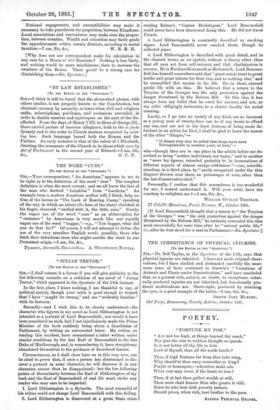"JULIAN TREVOR."
[To THE EDITOR OF THE " SPECTATOR."] -Sra,—I shall esteem it a favour if you will give publicity to the few following remarks on a criticism of my novel of " Julian Trevor," which appeared in the Spectator of the 13th instant.
In the first place, I know nothing, I am thankful to say, of political society, though your critic is good enough to remark that I have " caught its twang," and am " evidently familiar• " -with its features.
Secondly—and I wish this to be clearly understood—the character who figures in my novel as Lord Slitherington is not intended as a portrait of Lord Beaconsfield; nor would it have been considered as such, had I not injudiciously made the Prime Minister of the book suddenly bring about a dissolution of Parliament, by writing an unexpected letter. My critics, on reading this incident, have remembered a letter written under similar conditions by the late Earl of Beaconsfield to the late Duke of Marlborough, and, in remembering it, have straightway abandoned themselves to the guidance of disordered fancies.
Circumstances, as I shall show later on in this very case, can be cited to prove that, if once a person has determined to dis- cover a portrait is some character, he will discover it in any character, sooner than be disappointed ; but the few following points of dissimilarity between the Earl of Slitherington of my book and the Earl of Beaconsfield of real life must strike any reader who may care to be impartial.
1. Lord Slitherington is a Sybarite. The most uncandid of &is critics could not charge Lord Beaconsfield with this failing.
2. Lord Slitherington is discovered at a great State crisis reading Balzac's " Coutes Drolatiqnes." Lord Beaconsfield could never have been discovered doing this. He did not know French.
3. Lord Slitherington is constantly described as smoking cigars. Lord Beaconsfield never smoked them, though he collected pipes.
4. Lord Slitherington is described with great detail, and in the clearest terms, as an egotist, without a theory other than that all men act from self-interest, and that charlatanism is success. He is Machiavelli as much as Metternich. Lord Beacons- field has himself somewhere said that " great minds trust to great troths and great talents for their rise, and to nothing else," and he exemplified this maxim in his life. He, in short, entered public life with an idea. He believed that a return to the Toryism of the Georges was the only protection against the danger threatened by the Reform Bill. To this idea it has always been my belief that he owed his success, and not, as my critic obligingly insinuates, to a chance faculty for social cunning.
Lastly, as I go into no society of any kind, am as innocent as a young man of twenty-four can be of any desire to offend any one, and am not in the least desirous of being made de- fendant in an action for libel, I shall be glad to learn the names of the other " Shapes,"—
"If shapes they may be called that shape have none Distinguishable in member, joint, or limb,"-
who—though they are in one place in the article before me de- scribed as being " neither individuals nor types," and in another as "mere lay figures, intended probably to be incarnations of different aspects of almost savage selfishness "—can, notwith- standing, in a third place, be " easily recognised under the thin disguise thrown over them, as personages of note, other than the late Conservative chief."
Personally, I confess that this conundrum is too wonderful for me; I cannot understand it. Will your critic have the courtesy to enlighten me ?—I am, Sir, &c.,
WILLIAM OUTRAM TRISTRAM.
17 Colville Mansions, Powis Terrace, W., October 18th.
[If Lord Beaconsfield thought that a return to " the Toryism of the Georges" was " the only protection against the danger threatened by the Reform Bill," he certainly concealed this idea most successfully for some time after he " entered public life," i.e., after he first stood for a seat in Parliament.—ED. Spectator.]


































 Previous page
Previous page